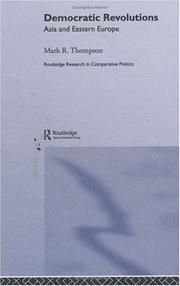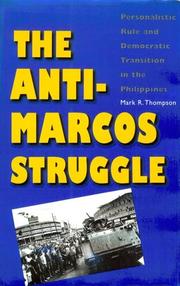| Listing 1 - 10 of 14 | << page >> |
Sort by
|
Book
ISBN: 1137511672 1137511664 Year: 2019 Publisher: New York : Palgrave Macmillan US : Imprint: Palgrave Pivot,
Abstract | Keywords | Export | Availability | Bookmark
 Loading...
Loading...Choose an application
- Reference Manager
- EndNote
- RefWorks (Direct export to RefWorks)
Following Barrington Moore Jr., this book raises doubts about modernization theory’s claim that an advanced economy with extensive social differentiation is incompatible with authoritarian rule. Authoritarian modernism in East Asia (Northeast and Southeast Asia) has been characterized by economically reformist but politically conservative leaders who have attempted to learn the “secrets” of authoritarian rule in modern society. They demobilize civil society while endeavoring to establish an “ethical” form of rule and claim reactionary culturalist legitimation. With China, East Asia is home to the most important country in the world today that is rapidly modernizing while attempting to remain authoritarian. Mark R. Thompson is Professor and Head, Department of Asian and International Studies and Director, Southeast Asia Research Centre, City University of Hong Kong, Hong Kong SAR.
Authoritarianism. --- Political science --- Authority --- Asia-Politics and government. --- Political science. --- Political theory. --- Economic policy. --- Asian Politics. --- Governance and Government. --- Political Theory. --- Development Policy. --- Economic nationalism --- Economic planning --- National planning --- State planning --- Economics --- Planning --- National security --- Social policy --- Administration --- Civil government --- Commonwealth, The --- Government --- Political theory --- Political thought --- Politics --- Science, Political --- Social sciences --- State, The --- Asia—Politics and government.

ISBN: 1134409478 1280054379 041540682X 0203506286 9780203506288 9786610054374 6610054371 9780415304153 0415304156 0415304156 9781134409426 9781134409464 9781134409471 9780415406826 113440946X 1870265378 1134409427 9781870265379 9781280054372 Year: 2004 Publisher: London Routledge
Abstract | Keywords | Export | Availability | Bookmark
 Loading...
Loading...Choose an application
- Reference Manager
- EndNote
- RefWorks (Direct export to RefWorks)
Democracy --- Self-government --- Political science --- Equality --- Representative government and representation --- Republics --- Asia --- Europe, Eastern --- East Europe --- Eastern Europe --- Politics and government --- International movements --- Eastern and Central Europe
Book
ISBN: 9781009398466 9781009398480 Year: 2023 Publisher: Cambridge : Cambridge University Press,
Abstract | Keywords | Export | Availability | Bookmark
 Loading...
Loading...Choose an application
- Reference Manager
- EndNote
- RefWorks (Direct export to RefWorks)
This Element explores how in the Philippines a 'whiggish' narrative of democracy and good governance triumphing over dictatorship and kleptocracy after the 'people power' uprising against Ferdinand E. Marcos in 1986 was upended by strongman Rodrigo R. Duterte three decades later. Portraying his father's authoritarian rule as a 'golden age,' Ferdinand R. Marcos, Jr. succeeded Duterte by easily winning the 2022 presidential election, suggesting democratic backsliding will persist. A structuralist account of the inherent instability of the country's oligarchical democracy offers a plausible explanation of repeated crises but underplays agency. Strategic groups have pushed back against executive aggrandizement. Offering a 'structuration' perspective, presidential power and elite pushback are examined as is the reliance on political violence and the instrumentalization of mass poverty. These factors have recurrently combined to lead to the fall, restoration, and now steep decline of democracy in the Philippines.
Democracy --- Power (Social sciences) --- History --- Philippines --- Politics and government --- Empowerment (Social sciences) --- Political power --- Exchange theory (Sociology) --- Political science --- Social sciences --- Sociology --- Consensus (Social sciences) --- Self-government --- Equality --- Representative government and representation --- Republics

ISBN: 0300062435 Year: 1995 Publisher: New Haven (Conn.) : Yale university press,
Abstract | Keywords | Export | Availability | Bookmark
 Loading...
Loading...Choose an application
- Reference Manager
- EndNote
- RefWorks (Direct export to RefWorks)
Digital
ISBN: 9781137511676 Year: 2019 Publisher: New York Palgrave Macmillan US :Imprint: Palgrave Pivot
Abstract | Keywords | Export | Availability | Bookmark
 Loading...
Loading...Choose an application
- Reference Manager
- EndNote
- RefWorks (Direct export to RefWorks)
Following Barrington Moore Jr., this book raises doubts about modernization theory’s claim that an advanced economy with extensive social differentiation is incompatible with authoritarian rule. Authoritarian modernism in East Asia (Northeast and Southeast Asia) has been characterized by economically reformist but politically conservative leaders who have attempted to learn the “secrets” of authoritarian rule in modern society. They demobilize civil society while endeavoring to establish an “ethical” form of rule and claim reactionary culturalist legitimation. With China, East Asia is home to the most important country in the world today that is rapidly modernizing while attempting to remain authoritarian. Mark R. Thompson is Professor and Head, Department of Asian and International Studies and Director, Southeast Asia Research Centre, City University of Hong Kong, Hong Kong SAR.
International relations. Foreign policy --- Politics --- Economic policy and planning (general) --- Development aid. Development cooperation --- Public administration --- internationale politiek --- ontwikkelingsbeleid --- economische politiek --- overheid --- politiek --- ontwikkelingssamenwerking --- ontwikkelingspolitiek --- East Asia --- Asia
Book
ISBN: 9197572705 Year: 2007 Publisher: Lund Lund university. Center for East and South-East Asian studies
Abstract | Keywords | Export | Availability | Bookmark
 Loading...
Loading...Choose an application
- Reference Manager
- EndNote
- RefWorks (Direct export to RefWorks)
Authoritarianism --- Democratization --- Middle class --- Political culture --- Protest movements --- Southeast Asia --- Politics and government
Book
ISBN: 9781137511676 Year: 2019 Publisher: New York Palgrave Macmillan US :Imprint: Palgrave Pivot
Abstract | Keywords | Export | Availability | Bookmark
 Loading...
Loading...Choose an application
- Reference Manager
- EndNote
- RefWorks (Direct export to RefWorks)
International relations. Foreign policy --- Politics --- Economic policy and planning (general) --- Development aid. Development cooperation --- Public administration --- internationale politiek --- ontwikkelingsbeleid --- economische politiek --- overheid --- politiek --- ontwikkelingssamenwerking --- ontwikkelingspolitiek --- East Asia --- Asia
Dissertation
Year: 2009 Publisher: [S.l.]: [chez l'auteur],
Abstract | Keywords | Export | Availability | Bookmark
 Loading...
Loading...Choose an application
- Reference Manager
- EndNote
- RefWorks (Direct export to RefWorks)
Book
ISBN: 1003211828 1000771121 1000771148 1003211828 1032075112 Year: 2022 Publisher: Taylor & Francis (Unlimited)
Abstract | Keywords | Export | Availability | Bookmark
 Loading...
Loading...Choose an application
- Reference Manager
- EndNote
- RefWorks (Direct export to RefWorks)
Book

ISBN: 9781685857479 Year: 2022 Publisher: Boulder
Abstract | Keywords | Export | Availability | Bookmark
 Loading...
Loading...Choose an application
- Reference Manager
- EndNote
- RefWorks (Direct export to RefWorks)
| Listing 1 - 10 of 14 | << page >> |
Sort by
|

 Search
Search Feedback
Feedback About UniCat
About UniCat  Help
Help News
News